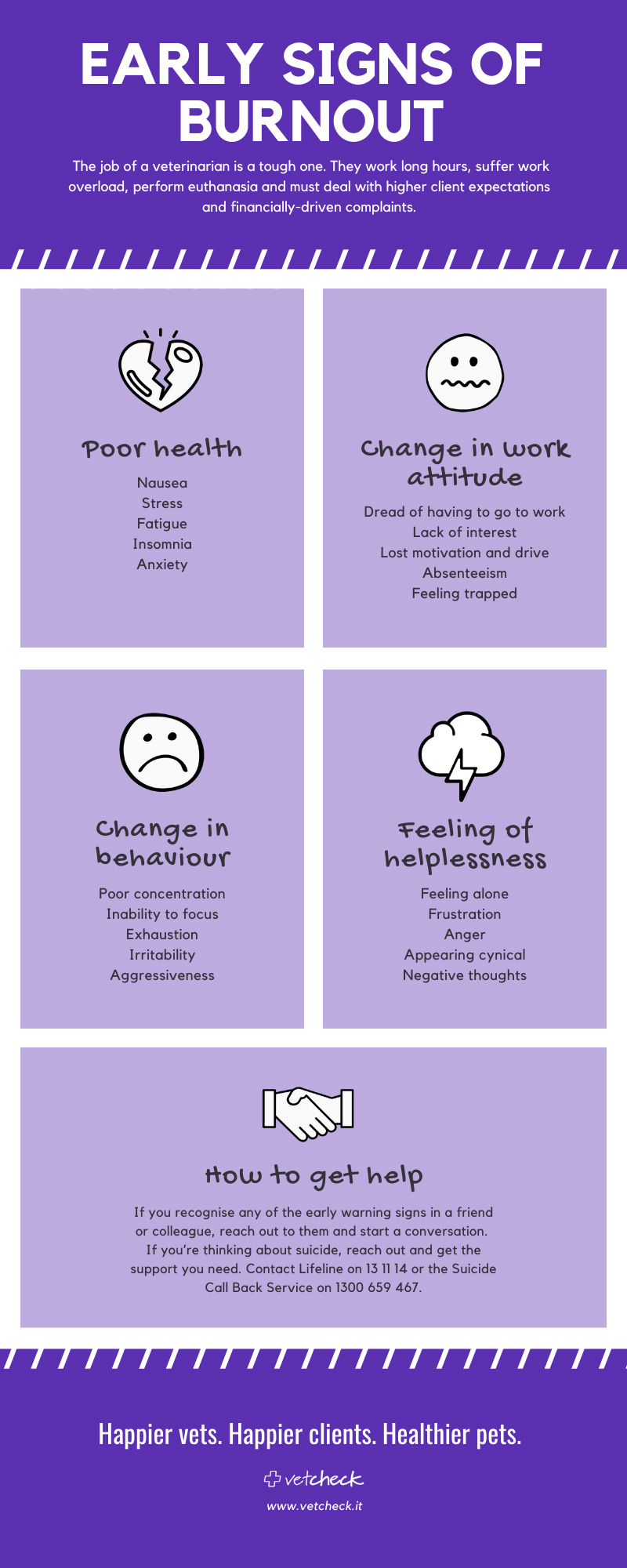
Important updates on veterinary wellbeing - An interview with Dr. Nadine Hamilton, Psychologist
Dr Hamilton helps veterinary professionals get on top of stress and conflict to avoid burnout and suicide, and also works with practice managers and owners to increase wellbeing, productivity, and retention in the workplace. She has successfully completed doctoral research into veterinarian wellbeing, and is the proud founder of the "Love Your Pet Love Your Vet" charity. She is also completing PhD studies to further research stress, burnout, and suicide within the veterinary profession, and released her new book “Coping with Stress and Burnout as a Veterinarian”. Dr Hamilton works tirelessly to advocate for veterinary wellbeing and the paradigm shift she believes is needed in order to facilitate positive change within the profession.
The Interview
What is the suicide rate among veterinarians?
DeGioia and Lau (2011) reported on research conducted by the Centre for Suicide Research at Oxford University, where there were significantly elevated rates of veterinarian suicide in Australia, Belgium, Norway, the United Kingdom, and the United States. The results of this research suggest a very real link between the veterinary profession and high risk of suicide.
Sadly, within Australia, a veterinarian will commit suicide approximately every 12 weeks (Martin, 2014). Jones-Fairnie, et al. 2008 report that in the period from 1990 to 2002, 11 veterinarians in Victoria and Western Australia had committed suicide. The rates of suicide for veterinarians in Victoria and Western Australia are estimated to be respectively 3.8 times and 4.0 times the age-standardised rate for suicide in the adult populations of their respective states. Furthermore, it was reported that for two states within Australia, veterinarians had a suicide rate of 45 per 100,000 person years, which is roughly four times the general population rate within these two states.
What are the top risk factors for burnout and suicide?
Based on my research the top five factors (in no particular order) for veterinarians are:
- Compassion fatigue
- Dealing with difficult clients
- Financial concerns (both financial issues with clients but also for those running their own practice)
- Performing euthanasia
- Unrealistic expectations (both those that clients place on them, but also those placed on themselves).
RELATED ARTICLE: Guide to managing difficult clients
What are the early signs of burnout?
The following symptoms can be signs of burnout:
- Nausea, stress, insomnia, anxiety
- Withdrawal / lack of interest, passion, motivation, and drive
- Dread at the thought of having to go to work
- Frustration and/or anger
- Exhaustion and fatigue
- Responding in a negative way to others
- Appearing more cynical
- Absenteeism
- Inability to function effectively (focus, concentration)

What are some strategies in dealing with time management issues because the fact is, vets only get 15 minutes in a consultation, have to deal with emergencies, surgery and client callbacks?
- Be realistic about what they can do within the timeframes they are given. The more you push yourself, the more you could be putting yourself at physical and psychological risk. I believe there is a need for vets to speak up about the demands placed on them if they are unrealistic
- Try and group similar tasks together – such as returning phone calls and replying to emails during a dedicated time rather than being interrupted during consultations
- Be assertive with others around you – if you are being interrupted by others during a consultation or other tasks (and it is non-urgent), then respectfully let them know you will get to them once you have finished your task (rather than dropping everything to help them do what they need to do)
- Remember – a lack of planning on someone else’s part does not constitute an emergency on yours!
Communicating with clients is a major part of the clinical process. Yet it is one of the most challenging. What are your tips in managing clients and their expectations?
- Be realistic and speak up assertively – if their expectations are unrealistic, then let them know this in a respectful way
- Be empathic and ask yourself what this must be like for them (for example, are they stressed that their animal is suffering and they may not be able to afford the treatment?)
- Don’t be bullied into doing things you don’t want to or think is wrong
- Don’t reinforce their negative behaviour – instead, nip it in the bud and let them know that their behaviour is inappropriate and you will not continue the consultation with them if they do not act in a more appropriate manner
What do you mean by handle clients confidently and assertively?
- When you speak assertively you make “I” statements – so instead of saying to someone else things like “you always to do this” or “you never do that”, change this to “I notice that it seems I’m always the one who does this or that”
- State the problem, how it makes YOU feel, and then explain what you would like as an ideal outcome – for example “I’ve noticed that your cat isn’t in a cat carrier when you bring him/her to our clinic, which unfortunately seems to be having a negative impact on the other animals. I’d really appreciate it if you could please bring your cat in a carrier next time (then give them options of where to buy or hire one) so we can limit the amount of stress to all the animals”.
What would be your advice on handling financial conversations with clients?
- Be empathic – explaining to the client that you understand their situation and that unfortunately veterinary care does cost money (just like human medical care). Explain to them what options are available – and the benefits/potential outcomes of each option (so they can see why the most expensive option would potentially be the best – rather than them assuming you just want to get the most money)
- Explain to clients why things are expensive – such as no government rebates for their treatment (here in Australia we have Medicare for our human medical care which provides a lot of no-out-of-pocket treatment, or rebates, for many of us) and also that the cost of running a practice can be very high. Perhaps reiterate that unfortunately pharmaceuticals are not subsidised and this can also contribute to the costs (as well as being outside of the control of the veterinary staff).
RELATED ARTICLE: Discussing the cost of veterinary care
What would be some of your strategies to cope with feeling overworked?
- Set boundaries with your clients - the more you give, the more they will take. If you continually treat their pets without scheduled appointments (unless it's an emergency of course!), particularly if it is right before closing, this can reinforce to them that this is acceptable
- Utilise after-hours clinics for those after-hours emergencies. While it may not always be possible to refer a patient straight to the after-hours emergency, it may be appropriate to stabilise the patient and then refer to the after-hours emergency for appropriate treatment....rather than you and your staff staying late into the evening to monitor and treat the patient
- Engage students on placement to cover busy lunch periods, so all staff can have a break (which they are legally entitled to)
- Practice time management strategies
- Take a proactive approach to stress management
- Have a roster system for emergencies and last-minute appointments (so the same staff aren't required to remain late every time)
- Award time off in lieu or some other reward for any overtime worked - while money can be a good incentive, it is not always what staff what
- Learn and implement effective, evidence-based coping skills such as Acceptance and Commitment Therapy
- Make sure you take time out for your own wellbeing, and do something you really enjoy (so long as it is healthy and legal!)
- Talk to your colleagues about how you are feeling - chances are they might be feeling the same way
- Seek professional support if you feel you are unable to cope on your own (I work directly with vets in a discrete way for coaching, counselling, and workshops)
- Speak up and don't suffer in silence!
Many aspects of veterinary practice will not change ie. being time poor, dealing with difficult clients and euthanizing pets. It is a way of life, albeit a difficult one. What are your top 5 strategies to deal with the demands of every day work?
- Learn effective, evidence-based coping strategies to help you cope with the demands (my choice is Acceptance and Commitment Therapy)
- Find effective, safe, healthy, and legal ways to manage your stress
- Learn beneficial time management strategies to help you get control of your day
- Definitely learn how to become more assertive to enable you to communicate more effectively
- Maintain your wellbeing with strategies such as Positive Psychology, relaxation, taking time out, socialising, and focusing on gratitude.
Top VetCheck templates for handling difficult client conversations
We've put together the top VetCheck resources to help you handle some difficult conversations that you face in practice every day.
1.Fear-free visits for your dog
2.How to transport your cat to the vet
5.Extra-label or off-label drug usage
6.What to expect with a cancer diagnosis
9.What to expect with euthanasia
There are over 1400 VetCheck templates that also help veterinary teams save time in explaining treatment options, duration of treatment, potential outcomes and prognoses.